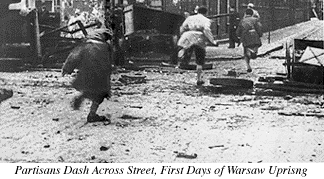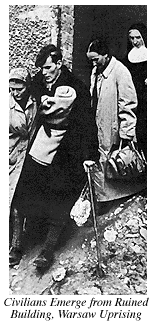
JOHN DAMSKI: Christine and I were getting by, living in a room across the street from the Opera House. On August 1, 1944, I came home about five o'clock in the afternoon. I was home only a few minutes, when suddenly we heard shooting coming from all over the city. We knew what it was: the Warsaw Uprising. Everyone knew the underground was preparing for a revolt. The Russians were already on the other side of the Vistula; we could see their tanks in Praga from the third floor of our building. So we were a little bit prepared for such an eventuality. We had amassed some food--a few pounds of bacon, two or three loaves of bread.
We attempted to make our way to the Old Town in the center, where the partisans had their stronghold, but you were not allowed out in the street unless you were in the fighting forces. We made our way from our basement through the basements of the next four houses--Warsaw had an old sewer system with large tunnels connecting one building's basement to the next; you could go a whole block through these tunnels. Then we needed to go above ground, to run across a street that had no tunnel.

"Down here you're going to die," I said. "The house will collapse and we'll be buried. If we go up we still have a chance."
Somehow I got her out of that basement, and just at that moment a bomb fell on the building. It lodged on the second floor. Everything was collapsing. She fell. I thought she got hit by something, but it was the impact. "Well," I said, "that's a sign we should get out of here."
We were two buildings away from the Polish Ministry of Agriculture, when the Germans started burning out the houses. Our apartment building, across from the Opera, was already on fire. We were trying to put out the flames with buckets of water, but I couldn't keep it up for long; the fire was too much for me. When I gave up, a woman took over from me. We moved to the next building, then that house burned out. We moved again, and that house burned too. Now we were out on the street. We saw what must have been the remains of a garden plot; somebody had dug a hole, just large enough for the two of us to slide into. Cinders were flying everywhere. You couldn't see the sun for all the ashes; it was like a huge orange ball. All of Warsaw was burning. I had to urinate on my handkerchief and cover Christine's head with it, to keep her hair from burning. I found an empty cement bag to put over our heads, to conceal us from view. We stayed in that hole for three days.
The second evening it was so very quiet, I said, "I'm going out to see what is happening. Maybe the war is over." In front of the second house where we had been I saw people we knew lying there, dead. The heat had burned up the noses and ears, but I could still recognize them. From a big heap a man called out a woman's name, "Hanka! Hanka!" I don't know if he was crazy or what. Every dog in Warsaw was howling.
 I went back to our hole. The morning after the third night, we heard a shout, "Out! Everyone out! If you don't get out I'll throw a grenade!" I said to Christine, "This is it. We have to get out." They had found us with their dogs.
I went back to our hole. The morning after the third night, we heard a shout, "Out! Everyone out! If you don't get out I'll throw a grenade!" I said to Christine, "This is it. We have to get out." They had found us with their dogs.
The German military in that part of Warsaw was a battalion of the worst criminals from the S.S., sent there to rehabilitate themselves--they called it "The Rehabilitation Battalion." In the whole world you couldn't find a more rotten bunch than those guys. As I came out of the hole, I could hear that the fellow who roused us out had a Rhinelander accent. The people from the Rhineland speak German very well, but a bit softer than the Berliner.
"Are you from the Rhineland?" I asked.
"Yah."
I told him I was from the Rhineland too; I was born there.
"So what are you doing over here?"
I told him I was a businessman, caught in Warsaw by the Uprising, and Christine was my Polish wife. I couldn't say she was German because she didn't speak German.
We were saved, for the moment. They took us to the basement under the Opera House. It was a very large space; there were probably two or three hundred women in there, and not more than six or seven men. There was no light, no electricity--just a few candles. After a few days, some of these convict S.S. came in saying, "All the men, out!" I could hear what was happening to each one as he went out. "Pppfook!" They shot them on the spot. They weren't particular about whether or not they were partisans; they shot them all.
Christine was wearing her fur coat--in August! Quickly she covered me with the coat, and sat on top of me, keeping me hidden. A very young S.S.--only about eighteen or twenty years old--was strolling back and forth with his rifle, singing: "Mother, give me a horse, a horse is my paradise." That was his song. He had seen Christine put her coat over me. He stopped singing to lean over and say to her, "There's always time to go to heaven." Then he turned around, and began his song again. He didn't say a thing. That was a moment we will never forget.